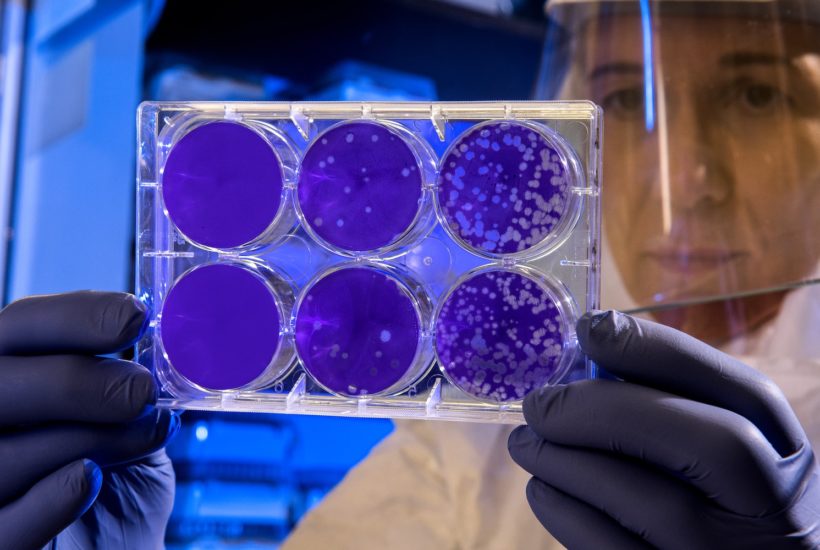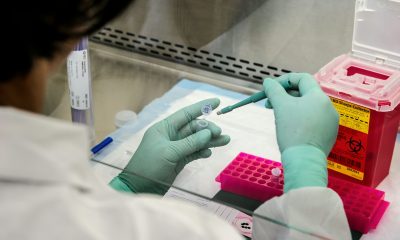Biotech
BioTech start-ups race to find active ingredients to fight the coronavirus
The young Graz-based company Innophore is conducting research for the “Chinese Center for Disease Control and Prevention” on molecules that bind parts of the coronavirus to make it harmless. The team has been working together with a group of selected bioinformaticians from a leading pharmaceutical company in Beijing on proposals for possible drugs against the virus.

The coronavirus is keeping health organizations on tenterhooks. The emerging virus, known by the WHO as “2019-nCoV,” has caused more than 100 deaths worldwide following infection outbreaks. Originating from the Wuhan region in China, there have been cases of infection in other countries such as France, Germany or the U. S., and suspected cases are now also reported in Austria.
At Vienna International Airport Schwechat, increased attention is being paid to this issue. Even though many experts point out that the virus, a relative of the MERS and SARS viruses, is less dangerous than the flu, yet a feverish search for an antidote is currently underway.
Discover the most crucial financial news and the latest happenings in the biotech sector with the Born2Invest mobile app.
Search engine for active ingredients
The Graz-based biotech company Innophore has now also joined this search. According to the young company, Innophore is working for the “Chinese Centre for Disease Control and Prevention” on molecules that bind parts of the virus and render it harmless.
In a short time, “active substances approved for other viruses” would have been found that could theoretically combat the coronavirus. The research on an active substance is carried out on the computer using a so-called “cataphoretic platform”. This is a kind of search engine that uses algorithms and Big Data to find enzymes and active ingredients quickly and cost-effectively. As a result, this process should be much faster than labratory tests.
At Innophore, events have taken a turn for the worse in the last few days. Christian Gruber, Managing Director of the 11-member company said: “On our own initiative, we looked for one of the key enzymes of this class of viruses in the genome of the coronavirus 2019-nCoV, which had been published just a few hours earlier, and found it. Based on this, we used our technology to identify known and approved compounds for other viruses that could theoretically combat the coronavirus. In research circles, this is called ‘drug repurposing’ or ‘drug repositioning’ – the finding of already approved drugs for new pharmaceutical purposes. After we published these research results, they quickly became independent and I was contacted by a leader of a large pharmaceutical company in Beijing.”
Spin-off of the University of Graz
According to Gruber, the question is whether the theoretically discovered substance will also work in practice. To this end, Gruber works together with bioinformaticians from a pharmaceutical company in Beijing and the “Chinese Center for Disease Control and Prevention.” Whether the active substance identified and recommended by Innophore actually achieves the desired effect against the virus will become clear over the next few weeks. If it does indeed succeed, it would be quite a success for the spin-off from Karl Franzens University and the Austrian Centre of Industrial Biotechnology (ACIB).
Innophore was founded in 2017 by Doctors Christian Gruber and Georg Steinkeller and University Professor Karl Gruber. Around 60% of the young company now belongs to the strategic investor EOSS Industries.
According to its own statements, EOSS invests in start-up projects and spin-offs, pursuing a “strictly entrepreneurial investment strategy.” As the majority owner said: “In our joint ventures with idea providers, entrepreneurs and managers, we do not act as financiers, but as co-entrepreneurs and offer a highly effective ecosystem. Real customer projects and continuous innovation processes form the basis for sustainable development.”
__
(Featured image by CDC via Unsplash)
DISCLAIMER: This article was written by a third party contributor and does not reflect the opinion of Born2Invest, its management, staff or its associates. Please review our disclaimer for more information.
This article may include forward-looking statements. These forward-looking statements generally are identified by the words “believe,” “project,” “estimate,” “become,” “plan,” “will,” and similar expressions. These forward-looking statements involve known and unknown risks as well as uncertainties, including those discussed in the following cautionary statements and elsewhere in this article and on this site. Although the Company may believe that its expectations are based on reasonable assumptions, the actual results that the Company may achieve may differ materially from any forward-looking statements, which reflect the opinions of the management of the Company only as of the date hereof. Additionally, please make sure to read these important disclosures.
First published in trendingtopics, a third-party contributor translated and adapted the article from the original. In case of discrepancy, the original will prevail.
Although we made reasonable efforts to provide accurate translations, some parts may be incorrect. Born2Invest assumes no responsibility for errors, omissions or ambiguities in the translations provided on this website. Any person or entity relying on translated content does so at their own risk. Born2Invest is not responsible for losses caused by such reliance on the accuracy or reliability of translated information. If you wish to report an error or inaccuracy in the translation, we encourage you to contact us.

-

 Impact Investing1 week ago
Impact Investing1 week agoClimate Losses Drive New Risk Training in Agriculture Led by Cineas and Asnacodi Italia
-

 Crowdfunding6 days ago
Crowdfunding6 days agoReal Estate Crowdfunding in Mexico: High Returns, Heavy Regulation, and Tax Inequality
-

 Africa2 weeks ago
Africa2 weeks agoAgadir Allocates Budget Surplus to Urban Development and Municipal Projects
-

 Cannabis3 days ago
Cannabis3 days agoSouth Africa Proposes Liberal Cannabis Regulations with Expungement for Past Convictions






















